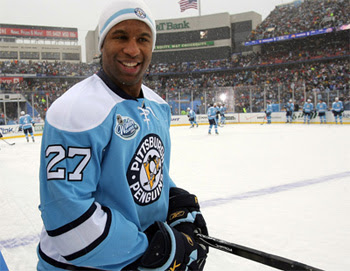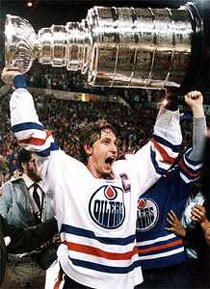 On Monday, when I watched Scott Stevens get inducted to the Hockey Hall of Fame, I couldn't help but wonder if we'll ever see another one just like him.
On Monday, when I watched Scott Stevens get inducted to the Hockey Hall of Fame, I couldn't help but wonder if we'll ever see another one just like him.
Bobby Orr is the greatest defenseman in hockey history and Paul Coffey was the slickest. Ray Bourque, Nicklas Lidstrom, Denis Potvin and Viacheslav Fetisov were four of the most complete defenders I've ever seen. Great hockey historians will sing the praise of a couple of classic fellows named Doug Harvey and Eddie Shore. And we cannot forget greats like Larry Robinson, Tim Horton, Chris Chelios, Brian Leetch, Borje Salming, Brad Park, and Al MacInnis. In fact, there are many rearguards who deserve all sorts of accolades and praise, but will there be another Scott Stevens?
In a game where there is a fine line between violence and elegance, few players have been able to combine the two and excel at the highest level. Gordie Howe, the legendary Mr. Hockey himself, was able to. So was Mark Messier, Denis Potvin and Larry Robinson, to name a few others.
 But did any of these elite players do it with the same fervor as Scott Stevens? Some say yes, but I would imagine Eric Lindros and Paul Kariya may beg to differ. After all, it was Stevens who earned his stripes by bringing the pain when money was on the line. And the more at stake; the more pain Stevens dished out.
But did any of these elite players do it with the same fervor as Scott Stevens? Some say yes, but I would imagine Eric Lindros and Paul Kariya may beg to differ. After all, it was Stevens who earned his stripes by bringing the pain when money was on the line. And the more at stake; the more pain Stevens dished out.
Who could forget the hit Stevens laid on Lindros during the 2000 Eastern Conference Finals, other than Lindros himself? I remember watching that game on television and wondering aloud if Lindros would ever hop over the boards and take another shift in the National Hockey League. And Lindros wasn't the only opponent to make the Scott Stevens hit list in Stanley Cup play; Slava Kozlov, Paul Kariya, Daymond Langkow, Shane Willis, Ron Francis and Kevyn Adams all felt the wrath of Stevens and have the CT and MRI scans to prove it.
 Stevens primarily used brutality and intimidation to capture three Stanley Cups in his career (1995, 2000 and 2003), but he contributed in the skill department as well, registering an impressive 118 points in 233 career post-season games. An underrated puck mover and passer; Stevens was also blessed with a heavy shot from the point. But it was the hard-nosed approach he employed at his position that made him special, and Stevens received his just due and recognition in 2000, when he was awarded the Conn Smythe trophy as playoff MVP.
Stevens primarily used brutality and intimidation to capture three Stanley Cups in his career (1995, 2000 and 2003), but he contributed in the skill department as well, registering an impressive 118 points in 233 career post-season games. An underrated puck mover and passer; Stevens was also blessed with a heavy shot from the point. But it was the hard-nosed approach he employed at his position that made him special, and Stevens received his just due and recognition in 2000, when he was awarded the Conn Smythe trophy as playoff MVP.
For more than two decades, Stevens terrorized opponents, and the punishment Stevens often dished out, yet seldom received, finally took its toll. In 2005, Stevens was forced to hang up the blades, ironically due to post-concussion syndrome.
 Not only did Stevens' retirement leave a void on the Devils blue line, it also presented a league-wide question that has remained unanswered: Who is the next Scott Stevens? (Or shall I say, the closest thing to him?)
Not only did Stevens' retirement leave a void on the Devils blue line, it also presented a league-wide question that has remained unanswered: Who is the next Scott Stevens? (Or shall I say, the closest thing to him?)
This is not an easy question to answer. Hell, in case you haven't noticed, times have changed. Bodychecking in the NHL is now being scrutinized more than ever. No longer are mercenary crease-clearers and rugged defenders as coveted as decent goal scorers. This makes it quite difficult for a player in the Stevens-mold to rule by intimidation. In the current NHL climate, blueliners being groomed need to be mobile, swift and posses a keen hockey sense.
That being said, there are a handful of young generals on defense who can attempt to fill the void left by Scott Stevens. They are:
1. Dion Phaneuf, Calgary Flames. This 6'3", 210 pounds of beef is the top candidate to replace Stevens as the premiere physical defensive package in the game.
 Only 22 years of age, Phaneuf has already cemented a reputation as both a headhunter and goal scorer. And like Stevens early on in his career, Phaneuf must learn how to control his emotions and pick his spots selectively, in order to help his team. Plain and simple, Phaneuf is more valuable when he's punishing opponents on the ice and not cooling off in the sin bin after taking undisciplined penalties. Now in his third season, Phaneuf often plays with the poise of a veteran rearguard; logging tons of minutes in all game situations. If the Flames can build around him and Kiprusoff the way the Devils built around Stevens and Brodeur, Phaneuf could one day be mentioned in terms of the great defensemen of his era.
Only 22 years of age, Phaneuf has already cemented a reputation as both a headhunter and goal scorer. And like Stevens early on in his career, Phaneuf must learn how to control his emotions and pick his spots selectively, in order to help his team. Plain and simple, Phaneuf is more valuable when he's punishing opponents on the ice and not cooling off in the sin bin after taking undisciplined penalties. Now in his third season, Phaneuf often plays with the poise of a veteran rearguard; logging tons of minutes in all game situations. If the Flames can build around him and Kiprusoff the way the Devils built around Stevens and Brodeur, Phaneuf could one day be mentioned in terms of the great defensemen of his era.
2. Erik Johnson, St. Louis Blues. The top choice in the 2006 NHL Entry Draft was the the number one rated hockey prospect in the world before making the leap to the NHL this season with the Blues.
 Johnson is a solid 6'4", 225 pound blueliner who is equally skilled at both ends of the ice. While he does not currently warrant the reputation as a punishing intimidator like Stevens or Phaneuf, Johnson will take the body and occasionally leave opponents in a world of hurt. He has big-game defenseman written all over him and has the tools and frame to dominate physically. He may end up electing to take a path similar to Rob Blake - earning a lucrative living by playing physical while putting up excellent numbers - but his game will be well-rounded, nonetheless. The St. Louis Blues once made the mistake of losing Scott Stevens, and for their sake, one would hope they don't make the same mistake twice.
Johnson is a solid 6'4", 225 pound blueliner who is equally skilled at both ends of the ice. While he does not currently warrant the reputation as a punishing intimidator like Stevens or Phaneuf, Johnson will take the body and occasionally leave opponents in a world of hurt. He has big-game defenseman written all over him and has the tools and frame to dominate physically. He may end up electing to take a path similar to Rob Blake - earning a lucrative living by playing physical while putting up excellent numbers - but his game will be well-rounded, nonetheless. The St. Louis Blues once made the mistake of losing Scott Stevens, and for their sake, one would hope they don't make the same mistake twice.
3. Shea Weber, Nashville Predators. Paired with Dion Phaneuf, Weber was key in Canada capturing the gold medal at the World Juniors in 2005. A 2nd round pick of the Nashville Predators in 2003, Weber is an opposing defenseman with a large frame and powerful shot.
 At 6'3", 220 pounds, Weber has been known to dish it out and play a physical brand of hockey. Weber is a rough customer but doesn't necessarily play on the edge the way Stevens did when he was 22 years old, although he was suspended last April for three games at the IIHF World Championships for knocking out the German Yannic Seidenberg with a nasty elbow [WATCH VIDEO]. Weber played more of a reckless style for Kelowna of the WHL, while racking up 167 and 126 PIMS in 70 and 60 games respectively. So far in the NHL, Weber has focused more on rounding out the offensive part of his game, netting 17 goals and 40 points in 79 games for the Predators in 2006-07. He may not posses the day-to-day nastiness of Scott Stevens, but Weber is a nice package who will eventually be counted on to lead his team from the blue line.
At 6'3", 220 pounds, Weber has been known to dish it out and play a physical brand of hockey. Weber is a rough customer but doesn't necessarily play on the edge the way Stevens did when he was 22 years old, although he was suspended last April for three games at the IIHF World Championships for knocking out the German Yannic Seidenberg with a nasty elbow [WATCH VIDEO]. Weber played more of a reckless style for Kelowna of the WHL, while racking up 167 and 126 PIMS in 70 and 60 games respectively. So far in the NHL, Weber has focused more on rounding out the offensive part of his game, netting 17 goals and 40 points in 79 games for the Predators in 2006-07. He may not posses the day-to-day nastiness of Scott Stevens, but Weber is a nice package who will eventually be counted on to lead his team from the blue line.
4. Jack Johnson, Los Angeles Kings. Johnson is projected as a number one defenseman, capable of playing extensive minutes in all game situations.
 He is a mentally strong-willed competitor who decided to stay in college even though the NHL was calling, and the team that owned his rights (the Carolina Hurricanes) tried to seduce him with a large pay day. Ultimately, the Hurricanes lost their patience with Johnson and shipped the budding star to Los Angeles in a deal they will soon regret. He's not as big as the some of the other upper echelon two-way defenders in the NHL (6'1", 215 pounds), but J.J. has showed early on in his career that he can compete physically against all opponents. In a game late last season, Johnson dropped the gloves with Daniel Carcillo of the Phoenix Coyotes, letting it be known he will answer the call if challenged. This season, his first full one in the NHL, Johnson has played extremely solid hockey for a 20-year old. If his offensive production improves over time, Johnson will be a great all-around defender for the next decade-plus.
He is a mentally strong-willed competitor who decided to stay in college even though the NHL was calling, and the team that owned his rights (the Carolina Hurricanes) tried to seduce him with a large pay day. Ultimately, the Hurricanes lost their patience with Johnson and shipped the budding star to Los Angeles in a deal they will soon regret. He's not as big as the some of the other upper echelon two-way defenders in the NHL (6'1", 215 pounds), but J.J. has showed early on in his career that he can compete physically against all opponents. In a game late last season, Johnson dropped the gloves with Daniel Carcillo of the Phoenix Coyotes, letting it be known he will answer the call if challenged. This season, his first full one in the NHL, Johnson has played extremely solid hockey for a 20-year old. If his offensive production improves over time, Johnson will be a great all-around defender for the next decade-plus.
5. Anton Volchenkov, Ottawa Senators. Known as the Russian Bear, Volchenkov has a penchant for blocking shots and clearing the crease by any means necessary.
 He's been among the best defensive defensmen in the biz and this year was voted the 5th best defensive defenseman by The Hockey News. Volchenkov is 6'2", 235 pounds and plays the game with reckless abandon; patterning his game after past European roughnecks such as Ulf Samuelsson, Vladimir Konstantinov and Darius Kasparaitis. In the physical department, Volchenkov can go head-to-head with any of the league's best open-ice hitters, and defensively, the Bear is sound if not spectacular. Putting the puck in the net is where Volchenkov has trouble matching up against the others in this group. Even though Volchenkov boasts an impressive shot from the point, he rarely has the chance to unload it. Unfortunately for the Bear, he is, more often than not, limited to defensive responsibilities since the Senators have too many triggermen eating up power play time. If Volchenkov had the opportunity to put up better numbers, he would be the East's version of Dion Phaneuf.
He's been among the best defensive defensmen in the biz and this year was voted the 5th best defensive defenseman by The Hockey News. Volchenkov is 6'2", 235 pounds and plays the game with reckless abandon; patterning his game after past European roughnecks such as Ulf Samuelsson, Vladimir Konstantinov and Darius Kasparaitis. In the physical department, Volchenkov can go head-to-head with any of the league's best open-ice hitters, and defensively, the Bear is sound if not spectacular. Putting the puck in the net is where Volchenkov has trouble matching up against the others in this group. Even though Volchenkov boasts an impressive shot from the point, he rarely has the chance to unload it. Unfortunately for the Bear, he is, more often than not, limited to defensive responsibilities since the Senators have too many triggermen eating up power play time. If Volchenkov had the opportunity to put up better numbers, he would be the East's version of Dion Phaneuf.
If any of these guys hope to fill the empty skates of Scott Stevens, they have their work cut out for them. Stevens was a rare breed; one of the greats who played the game the way it should be played.
I'm a Flyers fan who bleeds orange and black; I've lived through every one the many wars against Stevens and his Devils; I'm also a fan of the game and can respect, and now honor, all that Ronald Scott Stevens brought to it each time he stepped on the ice.
-- TGOJ
 It’s sad that Don Sanderson died, but I do not think that the NHL should take into account what happens in another league. The NHL is full of millionaires getting big bucks for the most part and they get paid to take those risks. A tower crane operator gets paid big bucks because there is a chance he’s going to fall a few hundred feet to his death. The NHL is trying to take away all the risk associated with the game.
It’s sad that Don Sanderson died, but I do not think that the NHL should take into account what happens in another league. The NHL is full of millionaires getting big bucks for the most part and they get paid to take those risks. A tower crane operator gets paid big bucks because there is a chance he’s going to fall a few hundred feet to his death. The NHL is trying to take away all the risk associated with the game.


 Born on December 7th, 1940 in St. Catherines, Ontario, Gerald Michael Cheevers would eventually become a hockey legend in Beantown. And, although Cheesy never won a Vezina as the NHL’s top netminder, he will go down as one of the greatest (and most popular) goalies in league history.
Born on December 7th, 1940 in St. Catherines, Ontario, Gerald Michael Cheevers would eventually become a hockey legend in Beantown. And, although Cheesy never won a Vezina as the NHL’s top netminder, he will go down as one of the greatest (and most popular) goalies in league history.












 The only person happier to hear about the Great Expansion of the NHL in ’67, other than the owners who knew they would get a couple million dollars thrown their way, was Cesare Maniago.
The only person happier to hear about the Great Expansion of the NHL in ’67, other than the owners who knew they would get a couple million dollars thrown their way, was Cesare Maniago.











 Bobby Orr
Bobby Orr Al MacInnis
Al MacInnis On Monday, when I watched
On Monday, when I watched 







 7. Pittsburgh Pirates
7. Pittsburgh Pirates












